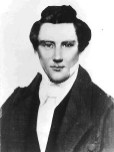
FAIR is a non-profit organization dedicated to providing well-documented answers to criticisms of the doctrine, practice, and history of The Church of Jesus Christ of Latter-day Saints.
| Answers portal |
| Joseph Smith, Jr. |

|
|
|
|
|
Critics claim that Joseph Smith lied about Warren Parrish, falsely charging him with financial misconduct, and trying to shift the blame.
To see citations to the critical sources for these claims, click here
There is hard evidence that Parrish was signing new notes for a large amount ($100) when the bank was already in deep difficulty. Whether intentionally fraudulent or not, this was unwise in the extreme—Joseph's caution was appropriate and well-founded.
An examination of surviving Kirtland Safety Society notes provides concrete evidence for Joseph's charge:
== Notes ==

FAIR is a non-profit organization dedicated to providing well-documented answers to criticisms of the doctrine, practice, and history of The Church of Jesus Christ of Latter-day Saints.
We are a volunteer organization. We invite you to give back.
Donate Now